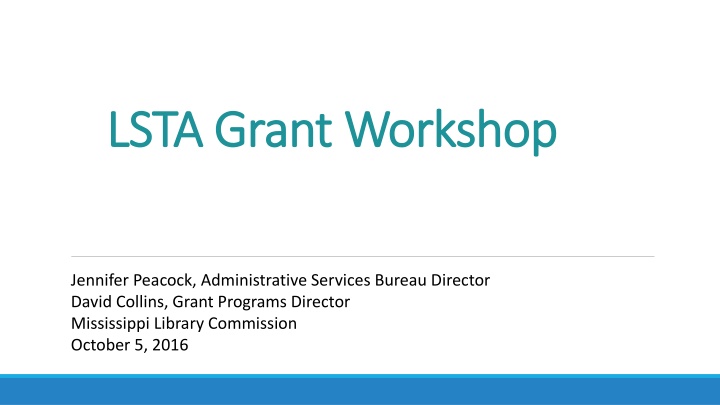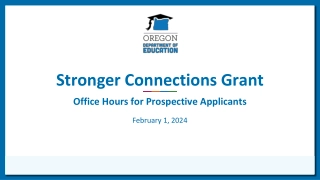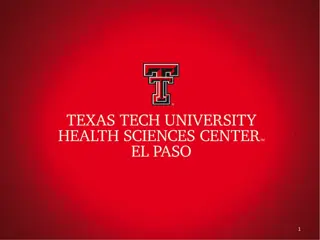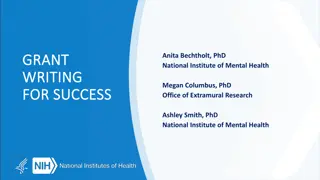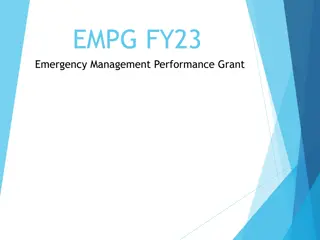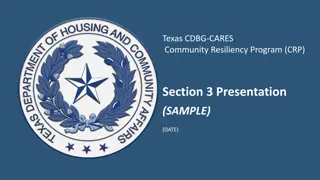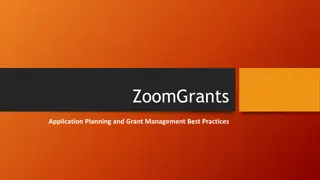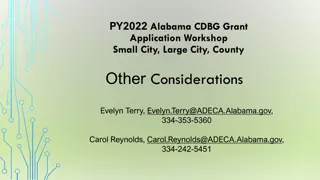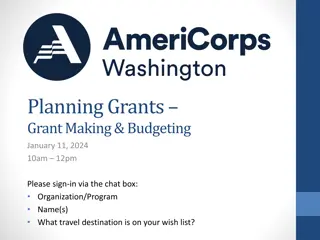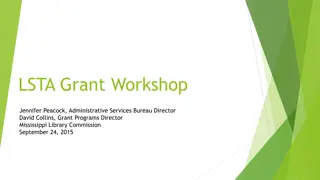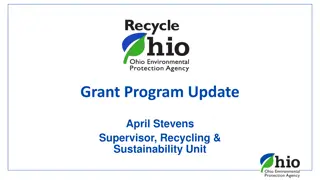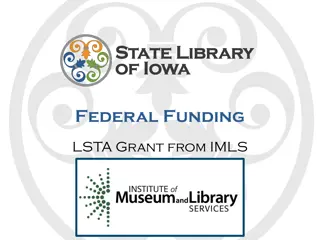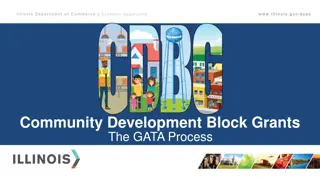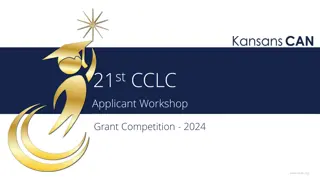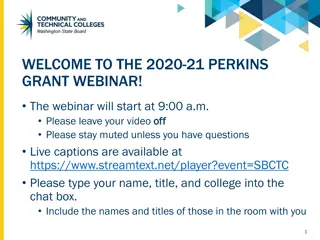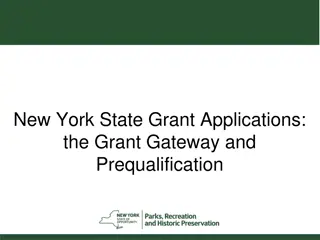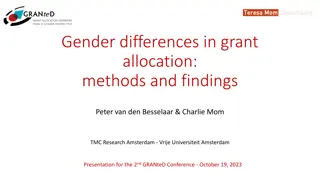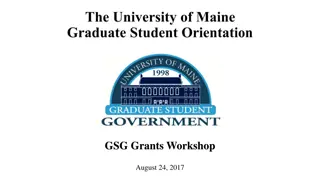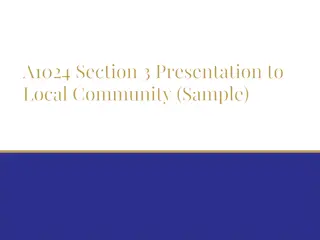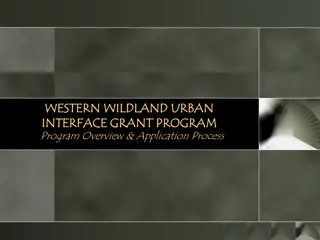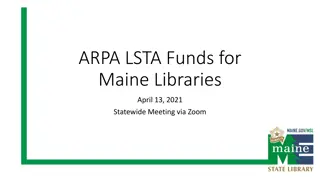LSTA Grant Workshop Overview
The LSTA Grant Workshop provides insights into the Grants to States program, detailing its history, funding distribution, and requirements for receiving funds. It covers program categories, application processes, and subgrant reimbursements, highlighting key aspects such as consulting, shared resources, continuing education, and more. This workshop serves as a comprehensive guide for organizations seeking federal funding to enhance library services.
Download Presentation

Please find below an Image/Link to download the presentation.
The content on the website is provided AS IS for your information and personal use only. It may not be sold, licensed, or shared on other websites without obtaining consent from the author.If you encounter any issues during the download, it is possible that the publisher has removed the file from their server.
You are allowed to download the files provided on this website for personal or commercial use, subject to the condition that they are used lawfully. All files are the property of their respective owners.
The content on the website is provided AS IS for your information and personal use only. It may not be sold, licensed, or shared on other websites without obtaining consent from the author.
E N D
Presentation Transcript
LSTA Grant Workshop LSTA Grant Workshop Jennifer Peacock, Administrative Services Bureau Director David Collins, Grant Programs Director Mississippi Library Commission October 5, 2016
Home GRANTS TO STATES PROGRAM The Grants to States program is the largest source of federal funding support for library services in the U.S. using a population based formula, more than $150 million is distributed among the State Library Administrative Agencies every year. 1956: Congress passed the Library Services Act (LSA), authorizing $7.5 million annually for 5 years for the extension and improvement of public library service in rural areas. 1962: LSA was reauthorized as the Library Services and Construction Act (LSCA), removing restrictions that limited funding to rural libraries and adding Title II, which contained funds for remodeling or construction of library buildings. 1996: Congress shifted LSTA to the Library Services and Technology Act (LSTA) as Subchapter II of the Museum and Library Services Act, ending federal funding for library construction and replacing it with a focus on new information technologies.
In order to receive these funds: MLC must submit a plan that details library services goals for a five-year period. MLC must conduct a five-year evaluation of library services based on that plan. MLC must meet a 34% cash match and meet MOE.
LSTA Programs Consulting Shared Resources Continuing Education Visually and Physically Handicapped (Talking Books Services) Network Development (Technology Services) Grants Reading Programs
Two Categories: COMPETITIVE NON-COMPETITIVE Application process opens January 2, 2017 Application process opens May 2, 2017 Application process closes April 15, 2017 Application process closes March 31, 2018 or when the money runs out
Subgrant Reimbursements Competitive/Non-Competitive Reimbursement Request Reimbursement Request Form Invoices (Good & Bad) Professional Development Reimbursement Request Expense Worksheet Staff Expense Worksheet In-House Training Documentation Reimbursement Request Form
Mode Format Quantity Partner Beneficiaries Locale Activity Intent
Intent An objective or expected result in a project. *See Key Terminology page.
Intent Examples from last grant period This project consisted of replacing four outdated patron computers located at the library with new computers. The library was using O/S Windows XP. These outdated computers were a security risk and inefficient with patrons needs. Library needed these computers to allow patrons internet access for finding employment and research purposes. This project was used to create educational resource collections in 3 branches for parents who lack access to adequate developmental literature and programming. These collections will provide families with tools to scaffold their children s learning and development.
Activities Action(s) through which the intent of a project is accomplished. Instruction - Involves an interaction for knowledge or skill transfer. Content - Involves the acquisition, development, or transfer of information. Planning/Evaluation - Involves design, development, or assessment of operations, services, or resources. Procurement - Involves purchasing facilities, equipment/supplies, hardware/software, or other materials (not content) that support general library infrastructure.
Modes How the activity is delivered, created or experienced.
Format Digital Physical Combined physical and digital
Partner Types You may or may not have one List what they contributed to the project. Options Federal Government State Government Local Government (excluding school districts) School District Non-Profit Private Sector Tribe/Native Hawaiian Organization Libraries Museums Preschools Adult Education Human Service Organizations
Beneficiaries Who directly benefited from the project. Were you targeting a specific group or population? Economic status Ethnic Demographics Families Intergenerational groups Immigrants/refugees Those with limited literacy or informational skills People with disabilities
Locale Was it statewide? You choose No. If no, can you identify the specific institution? If you can identify where, provide information about specific institutions If no, provide institution types List the actual site of the event. If multiple sites, list library system.
Miscellaneous Information Provide any additional materials from a website (Enter URL) PowerPoints Webpage Documentation
Project Outcomes List any important findings or outcomes from your project. Please briefly describe importance of findings. What methods did you use to determine your findings? Check all that apply: oSurvey oReview of Administrative Data oInterview/Focus Groups oParticipant Observation oOther
Questions? Contact: David Collins, Grant Programs Director dcollins@mlc.lib.ms.us (601) 432-4054 Jennifer Peacock, Administrative Services Bureau Director jpeacock@mlc.lib.ms.us (601) 432-4042
